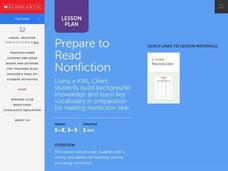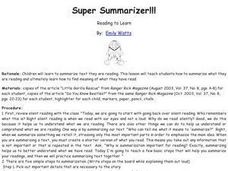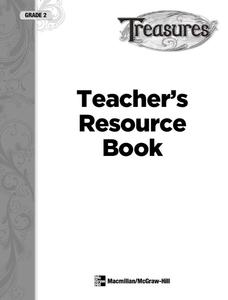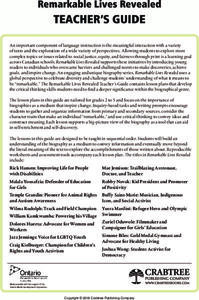Curated OER
Introduce Vocabulary: Animal Tracks (Dorros)
What kind of animal made those tracks? Explore some wild vocabulary in context as learners listen to Arthur Dorros' book, Animal Tracks. Before your read this, introduce the new words like bother, dam, reed,...
Curated OER
Introducing Vocabulary: Christopher Columbus (Weinberger)
The story of Christopher Columbus has fascinated young historians for centuries; use this vocabulary-in-context strategy to dive into Kimberly Weinberger's picture book about this classic explorer. Begin by introducing the new words:...
Curated OER
Introduce Vocabulary: Dinosaur Bones (Barner)
Dig into some prehistoric vocabulary in Bob Barner's informative book Dinosaur Bones. This works best if you introduce the primitive words before reading the story. These are the focus terms in the text: ancient, climate, extinct,...
Curated OER
Find The Hidden Message: Media Literacy in Primary Grades
Learners practice listening to and reading various types of media and text. In groups, learners use video, newspapers, magazines, and more to compare and contrast different types of information. They identify the differences between fact...
Curated OER
Selective Underlining Taking Notes
It is so important for learners to become selective and strategic readers. This slide show provides examples and practice exercises that encourage them to read informational text and selectively underline key points or information. Great...
Curated OER
Let There Be Peace: Nobel Prize Winners
What is the Nobel Peace Prize? After they establish criteria for great leadership, secondary learners read a New York Times article about President Jimmy Carter's acceptance of the Nobel Peace Prize in 2002. Individuals research the...
Curated OER
Ready-Set-Go-Whoa!
The Apaches: People of the Southwest offers readers a chance to employ the “Ready-Set-Go-Whoa!” strategy (an adaptation of the KWL) to test what they know and summarize what they learn as they read Jennifer Fleischner’s nonfiction...
Curated OER
Fiction vs. Nonfiction
Students explore fiction and nonfiction writing. They identify the elements of fiction in a short story and identify the criteria necessary in a nonfiction piece. Students distinguish the author's purpose in an expository text,...
Curated OER
Prepare to Read Nonfiction
Students get an introduction to using KWL Charts as tools for reading nonfiction. They study unfamiliar words and share what they already know about the topic of the non-fiction selection and use this knowledge to help prepare to read.
Curated OER
Nonfiction Text Features
Identify features of a nonfiction article in this language arts lesson. Middle schoolers apply comprehension strategies as they read the parts of the article, and analyze the author's key points. Additionally, they examine information in...
Curated OER
Guided Reading with Twister's Tricks
Students participate in pre-reading activities before reading the book, Twister's Tricks. They read the book independently, but are guided by directive questions from their teacher. A discussion follows, as well as repeated readings for...
Curated OER
Super Summarizer!!!
Emerging readers summarize a nonfiction text using a five step process. After a brief demonstration of the five-step method for summarizing text, they read a nonfiction article and write their own summary. A checklist of each summary is...
Curated OER
Insects
It's a fact: kids love bugs! With this instructional activity, young learners explore reading informational texts and conducting research while learning about their favorite insects. Spark learners' interest by reading a book about one...
Curated OER
The Learning Network: More Like Disney
A great source of high-interest reading for the language arts classroom! Meant to be used with an article also available on the New York Times website, this worksheet provides 10 comprehension questions about the reading as well as one...
Curated OER
Writing Prompts for High School
Are you teaching a high school language arts class and stumped for writing topics? Five pages of writing prompts for all kinds of writing should help you out. Many of these prompts refer to texts that are not included in this resource,...
McGraw Hill
Phonics Teachers Resource Book
Looking to improve your classes literacy program? Then look no further. This comprehensive collection of resources includes worksheets and activities covering everything from r-controlled vowels and consonant digraphs, to the different...
Curated OER
End-of-Year Practice Test (Grade 5 ELA/Literacy)
The end of the year has arrived, which means it's time to find out exactly what your fifth graders have learned over the past few months. With the help of this Common Core-designed assessment that includes two narrative passages and 12...
Hood River County School District
Text Structure: Features and Organization
Teach learners how to interact with both fiction and non-fiction text with a packet of activities and worksheets. After looking over text structure and the difference in text features between different types of writing, readers analyze...
Crabtree Publishing
Remarkable Lives Revealed
Six lessons make up a unit all about biographies. Scholars read about a remarkable life while taking notes and identifying characteristics of the biographical genre. Readers examine the tale's obstacles, accomplishments, and sequence of...
Curated OER
Phineas Gage: Concept Analysis
Prepare for teaching Phineas Gage: A Gruesome but True Story About Brain Science with this written analysis of the book. The analysis includes a summary, considerations for teachers, project ideas, and a list of additional resources that...
EngageNY
Analyzing the Significance of the Novel’s Title: Connecting the Universal Refugee Experience to Inside Out and Back Again, Part 2
How does poetry help people better understand societal issues? Pupils participate in a jigsaw activity to analyze poems from the novel Inside Out & Back Again. Next, they connect the poems to real-life refugee experiences from the...
EngageNY
Mid-Unit Assessment: Analyzing an Author’s Argument and Text Structure
William Shakespeare: a writer, a poet, a fake? For their mid-unit assessments, scholars read an excerpt from the article "The Top Ten Reasons Shakespeare Did Not Write Shakespeare" by Keir Cutler. Next, they analyze the author's argument...
Shmoop
ELA.CCSS.ELA-Literacy.RI.11-12.5: Structure of an Argument
Imagine a cross-curricular project that not only rewards learners for examining the textbooks used in their other classes but builds literacy skills as well! Groups compare the formats and writing style in their various textbooks. Teams...
Curated OER
Irony in Poetry and Prose (Fiction and Non-fiction Texts)
Middle and high schoolers examine the impact of irony in poetry and prose. In this figurative language lesson, they read instructor-selected literature and identify uses of irony. Then they discuss how irony enhances literature.

























